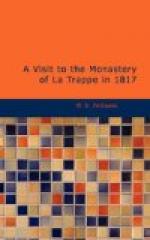“Many were the dangers M. de Rance underwent; plans were laid, at various times, to poison him, to waylay and assassinate him, and even once one of his monks shot at him; but the pistol, which was applied close to his head, flashed in the pan, and missed fire. By the good providence of God all these plans were frustrated, and M. de Rance not only brought his reform to bear, but several of his most violent persecutors became his most stedfast adherents; many were, after a short time, won over by his piety—the rest left the Monastery. He especially, who had shot at M. de Rance, became eminently distinguished for his piety and learning, and was afterwards Sub-Prior of La Trappe”.
M. de Rance lived forty years at the head of this singular society, and the same ardor and piety continued to distinguish him to the last. The excess of self-denial and discipline, exercised by this order, which might readily be doubted, became more known, especially to this country, at the time of the French Revolution, when they shared the fate of dissolution with the various religious orders in France. On that occasion many of them sought an asylum in England, and were settled in Dorsetshire, where they received the kind protection and benevolent assistance of Mr. Weld, until the restoration enabled most of them to return; and, surprising as it may appear in the present age, notwithstanding the perpetual violence imposed by their regulations on every human feeling, many are found anxious to enter the establishment.
When I was about to take my leave of Frere Charle, he said, “he hoped I was pleased with my humble fare: to such as it was I had been truly welcome”. Indeed he had treated me with the kindest, most unaffected hospitality; he had laid the table, spread the dishes before me, stood the whole time by the side of my chair, and pressed me to eat: How could I not be thankful? I requested he would be seated, but he observed that it was not proper for him to be so. His manners and general deportment bespoke him a well-bred gentleman; and when I ventured to ask if I might make a memorandum of his name, he bowed his head with meekness and resignation, and said, “I have now no other but that which was bestowed on me when I took the vow, which severs me from the world for ever!” It was impossible not to be affected at the manner and tone of voice in which he uttered this. When I said that perhaps he would like that I should leave an acknowledgment in writing, expressive of the gratitude I felt at my kind and hospitable reception, he appeared much pleased, and instantly procured me paper. I left with him the following lines:
“Convent of La Trappe, July 20, 1817.




